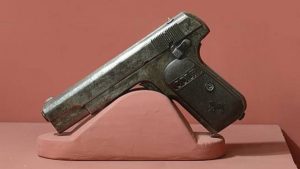
Weber famously- in Politics as a Vocation -defined the modern state by stating:
“Today, however, we have to say that a state is a human community that (successfully) claims the monopoly of the legitimate use of physical force within a given territory. Note that ‘territory’ is one of the characteristics of the state. Specifically, at the present time, the right to use physical force is ascribed to other institutions or to individuals only to the extent to which the state permits it. The state is considered the sole source of the ‘right’ to use violence. Hence, ‘politics’ for us means striving to share power or striving to influence the distribution of power, either among states or among groups within a state”
According to Max Weber then, a modern state is the one which actually has the monopoly over the use of physical force within a territory, and is the sole source of the right to use physical force. In simpler terms, only the State and the social actors who the State grants have the right to use physical force legitimately. The very essential observation here is that when a Modern Weber State- which pragmatically exists almost everywhere on Earth as of now -gets tyrannical, the only ways to resist the tyranny are non-physical means. Not only is this dangerous to the people living under the State, but the immediate events that took place after this statement was made(in 1918) by Weber- are indicators of following an akin State model. Whether that is Germany under the Nazis or the Soviet Russia, State actors like the Government have exercised usurpation physical force to even go on to kill its citizen. Whether India or any democracy, the right to use physical force should preexist the State. The people should have natural rights to use violence, and the Constitution should restrict the Government from infringing these rights.
The American founders recognized this, and so the United States of America have the Second Amendment in the Bill of Rights, which states:
“A well regulated Militia, being necessary to the security of a free State, the right of the people to keep and bear Arms, shall not be infringed”
Reaffirmed multiple by the United States Supreme Court that this right exists at the individual level. The Second Amendment allows the people to form a militia- by bringing their own arms -and resisting Government tyranny; and as the amendment says, the militia formed by the people to resist the Government is necessary for the security of the free State. Nazis in Germany and the Bolsheviks in Russia took away all the arms and destroyed the ‘free’ State. A clause like the Second Amendment in the US Bill of Rights is an utter necessity for any democracy, irrespective of the demographics. Gandhi- urging the Indian people to help the British Government in the First World War and the restrictions imposed on them via the India Arms Act of 1878- that banned guns from Indian hands -by the British rule writes:
“Among the many misdeeds of the British rule in India, history will look upon the Act depriving a whole nation of arms as the blackest. If we want the Arms Act to be repealed, if we want to learn the use of arms, here is a golden opportunity. If the middle classes render voluntary help to Government in the hour of its trial, distrust will disappear, and the ban on possessing arms will be withdrawn”
The argument often made against the use of this quote to point out Gandhi’s recognition of Gun Rights is one of stern adherence to the context i.e. an immobile opinion. Obviously, Gandhi is writing about ‘depriving a whole nation of arms’, but this only harbingers the entire point of restricting the government from making laws that take away the right to bear arms from the people. The Indian government can make a state second-class by depriving the law enforcement of the state of any arms. But there is room to draw the line, State Governments in India can get tyrannical to its own citizens too; and so the right to keep and bear arms should be recognized as a natural right of the individual, without any possible infringement to it from the legislation.
When an amendment was introduced by H.V. Kamath in the Constituent Assembly- to recognize the right to bear arms as a right to freedom – Ambedkar rejected the idea by saying:
“… I personally myself cannot conceive how it would be possible for the State to carry on its administration if every individual had the right to go into the market and purchase all sorts of instruments of attack without any let or hindrance from the State.”
But this is not a refutation of the primary purpose of having a law like the Second Amendment. To protect a non-tyrannical administration of the State from a potential militia, the laws shall resort to taking away guns from people with medically verified mental disorders, and not just have an outright gun ban- the purpose, of recognizing the ‘right to bear arms’ as a fundamental right of the people, is devoid of the reason that Ambedkar proposed i.e. the people should be able to use physical force to resist State tyranny.
Courtesy : Adrit Chaturvedi @Libertarian Conservatism

